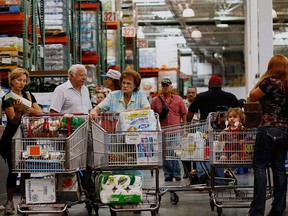Kevin Carmichael: A quick return to complacency about our flawed economy will waste a rare opportunity to make systemic change

Article content
March 11 is the one-year anniversary of the World Health Organization declaring a pandemic and some are betting that we’re on the verge of an historic party.
“In the 1920s, after the Spanish Flu and (the) First World War, there was a dramatic surge and you saw things like jazz clubs and ballroom dancing,” Cees ’t Hart, chief executive of Danish brewer Carlsberg A/S, told the Financial Times last month. “After (COVID-19), there will be for sure some bright side in our kind of business.”
Who wants to go dancing alone? Analysts at Citibank recommended buying shares in Bumble Inc., developer of the Bumble and Badoo dating apps, which is set to profit from the rich world’s release from lockdown and a growing willingness to share air and swap spit with vaccinated strangers.
Let’s keep things in perspective: the death toll from COVID-19 is 2.6 million and counting, and the economic loss has been epic. Canada’s gross domestic product shrunk by 5.4 per cent in 2020, more than in 2009 (the Great Recession) and 1982 (stagflation).
Advertisement
This advertisement has not loaded yet, but your article continues below.
Article content
Statistics Canada on March 10 estimated there were 13,798 more deaths in Canada in 2020 than would have been expected ahead of the pandemic. The agency also observed that while COVID-19 easily explains the initial increase, it doesn’t account for all of the excessive deaths through the autumn. That could be an early indicator that the pandemic is now having an indirect effect on mortality. For instance, Statistics Canada noted a spike in death from overdoses, especially in British Columbia and Alberta.

The numbers are sobering, but things could have been worse. The lockdown was met by an equally epic response by governments and central banks. Household disposable income actually increased last year, according to Statistics Canada. Retail sales last June passed their pre-pandemic level. Housing and equity markets are on fire.
Government stimulus, near-zero interest rates, the shift to a digital economy, and the imperative to confront climate change have combined to create a powerful tailwind. The possibility that the world is about to relive the Roaring Twenties is so irresistible that Bloomberg Businessweek, The Economist and MoneyWeek have all alluded to the possibility on their covers since the end of last year. It’s taboo in the media business to copy your competitors, so the repetition is telling.
Canada’s latest tally of gross domestic product (GDP) certainly roared, surging an annualized 9.6 per cent in the fourth quarter, twice as fast as the Bank of Canada was expecting. The surprise suggests two things: the economy entered the second wave of infections with momentum, and that we’re adapting to life with COVID-19.
Advertisement
This advertisement has not loaded yet, but your article continues below.
Article content

Exports of goods jumped 8.1 per cent in January from December, pushing the trade balance to a $1.4-billion surplus, the first since May 2019 and the biggest since July 2014. That’s important because Canada’s trade engine failed to re-engage after the Great Recession.
“We’re going to see a surge in demand when we get to the other side of the pandemic, maybe even some inflation,” Linda Hasenfratz, chief executive of automobile-parts maker Linamar Corp., said at a virtual conference hosted by the Canadian Chamber of Commerce last month. “Great economic growth is coming.”
The burst of euphoria, when it comes, will make it difficult to assess what we’ve been through during the past year. The focus that went into surviving the pandemic will be replaced by an impulse to simply get back to normal. We’ve suffered a traumatic event and it will be tempting to stop thinking about the crisis and simply enjoy the rebound.

We need to resist that urge. Carlsberg beer and casual hookups aren’t long-term fixes for chronic stress, and a quick return to complacency about the flawed economy we’ve built will waste a rare opportunity to make systemic change. Governments responded to the crisis correctly, but we should be embarrassed that spending of that magnitude was necessary. It was a display of weakness, not strength.
“No one should be doing any victory laps for that first quarter; that growth is strong because it’s just pent-up demand,” Mark Carney, the former head of the central banks of Canada and England, said last month in an interview with Nahlah Ayed, the host of CBC Radio’s Ideas program.
Advertisement
This advertisement has not loaded yet, but your article continues below.
Article content
“Do we have the sustainability of growth, which helps with the sustainability of debt?” Carney continued. “Do we have the sustainability of livelihoods? Are we creating the types of jobs that are actually going to stick around, as opposed to the types that we wish we had, or that are temporary?”
Carney argues that we erred by letting markets determine the value of everything. That philosophy incorrectly assumed ahead of the 2008-09 global financial crisis that self-interested bankers could be trusted to regulate themselves. Governments have spent much of the last decade re-erecting a firewall around the world’s largest banks, and they are now poised to spend the next decade working on policies that will neutralize carbon emissions since the markets won’t do it.

Weak governance also exacerbated the COVID-19 crisis, beginning with the failure to prepare for a pandemic despite repeated warnings that it was only a matter of time before a novel virus wreaked global havoc.
An embrace of tight fiscal policy and relatively low taxes resulted in a sterling credit rating, high profits and an underfunded health-care system that was no match for a mysterious disease.
Advertisement
This advertisement has not loaded yet, but your article continues below.
Article content
The country’s manufacturing base has been left to erode, because doing anything about it would violate our commitment to free trade and offend our infantile notions about the dangers of industrial policy. Meanwhile, the corporate elite plowed as much or more money into Caribbean tax havens than they did into investment opportunities at home or in fast-growing markets in Asia.
It was a big shakeup moment. Things are never going back to normal
Mary Rowe, president of the Canadian Urban Institute
One could go on. The point is that we were entirely unprepared for anything more difficult than a drop in oil prices or a wobble in demand for automobile parts from the United States. “It was a big shakeup moment,” Mary Rowe, president of the Canadian Urban Institute, a Toronto-based charity that works on city development, said of the pandemic. “Things are never going back to normal.”
Rowe, who participated in the rebuilding of New Orleans after Hurricane Katrina in 2005, said it’s too soon to identify the most important lessons of the COVID-19 crisis.
The Canadian Urban Institute’s work shows that some cities (Montreal, Edmonton) experienced much higher death tolls than others, suggesting high-level national and provincial assessments could miss important vulnerabilities that are specific to various communities.
Hasenfratz observed that many manufacturers, including Linamar, retooled on the fly to build ventilators and other vital equipment, indicating that the answer to concerns about resiliency is to perhaps create an environment in which factories thrive, rather than worrying about reshoring the production of personal protective equipment.
Carney advocates a frontal attack on climate change, as the investment required to get to net-zero would create jobs and wealth in service of avoiding a disaster that will otherwise dwarf the COVID-19 crisis.
All that and more are on the cards. As policy-makers have been repeating for years now: whatever it takes.
• Email: kcarmichael@postmedia.com | Twitter: CarmichaelKevin
Pandemic anniversary has some preparing for a party, but let’s keep things in perspective
2021-03-11 11:00:21




